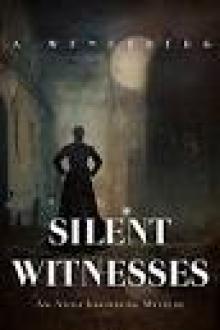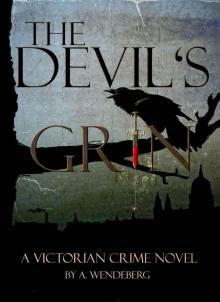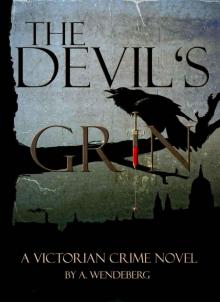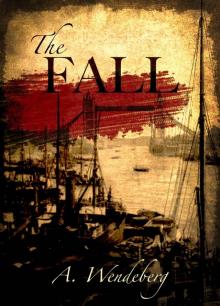- Home
- Annelie Wendeberg
Silent Witnesses Page 4
Silent Witnesses Read online
Page 4
Low mumbling interrupted the boy — probably McCurley, asking a question, because the boy said, 'Half past three. He looked frightened enough. No, he just sat there, poking at something between the rocks. The lady? Didn't see no lady.'
There was a pause, then the boy continued, 'My mother keeps a store on Broadway. She's a dressmaker, and also sells the materials for them. My brother and I sell newspapers. He owns a route in the city and I own one in South Boston. But we also sell 'em at the store.'
Another pause.
''Course I know all the faces and names of my customers! No, I never met Mrs Hyde. Read about her, I did. But Mrs Kennison that buys materials at the shop washes for— My papers? I get them at the New England News Company. 'Course, I sweep the store and fix up the windows too and— The chap with the funny hat? Seen him twice before. Spent a night in the shop's basement. Mum didn't want him out in the rain.'
And so it went on. McCurley made the boy jump from one topic to another, made him repeat himself several times. It was annoying but effective, and I told him so when I was finally called into his office.
'So you are an expert in interrogation now,' he drawled.
'Sharp observation and interrogation skills are crucial in my profession. Most patients don't wish to share all the symptoms they experience and even more lie about the severity of them. And some patients are unconscious, so I'm left to interrogate their bodies.' I sat in the offered chair, placed my briefcase on my lap, and pulled out a folder. 'And sometimes I interrogate their remains. Would you like me to walk you through my report?'
He stopped halfway to his chair, then made for the door. 'Brewer! Fetch Boyle for me.' He sat down and steepled his fingers.
When I opened my mouth to speak, he held up his hand, said, 'We wait for Sergeant Boyle.'
It didn't take long. Boyle arrived, scrambled to rip off his hat and introduce himself. As he quietly took a seat, I wondered what role he was to play, for neither did he whip out notebook and pencil, nor did he seem to occupy himself with anything but blinking apologetically.
Inspector McCurley fingered his short moustache. He was freshly barbered — the scar on the side of his face more severe now. Even his eyebrows had been lightly trimmed. 'Now, Mrs Arlington—'
'Dr Arlington.'
'Doctor Arlington, on the evening of the fifteenth of May, you examined the body of Mrs Henrietta Hyde. You state in your report that you were on your way home when you found a train blocking the road, and that — according to the time the stoker gave you — you arrived mere minutes after the accident. Is that correct?'
'Yes.'
'You have also stated that Mrs Hyde's body temperature indicated that she had been dead since approximately noon of that day.' He waited, so I gave him a nod.
'Would you care to explain this to me?' he asked.
'It is well known that after death, the temperature of a body decreases by about one and a half degrees Celsius per hour. Her head had been severed and lay several yards from where I found her body. I measured temperatures in the brain and the vagina, and they matched, which confirms the time of death and that the train decapitated the body. Both body parts were at eighty-two degrees Fahrenheit, which tells me that she must have died around noon. I am surprised these facts aren't known to you.'
'They are known to me. What I wish to know is how you come to the exact same conclusion as the post-mortem surgeon.'
I leant back, and crossed my arms over my chest. 'I am a physician and have been performing post-mortems for years.'
'Have you now.'
I was about to open my mouth and tell him that I'd been frequently summoned by Scotland Yard to examine corpses that seemed to have succumbed to a highly contagious disease under suspicious circumstances. Instead, I smiled and lied, 'I was a student of Dr Deffenheim, who was, in turn a student and good friend of Dr Alexandre Lacassagne. Perhaps you've heard of them? Lacassagne founded the school of forensic medicine in Lyon. Unfortunately, I don't speak French and never had the chance to learn from Lacassagne himself.'
'So you are telling me now that you are an expert in forensics?' His voice was dripping with mockery. From the corner of my vision, I saw Boyle shifting in his chair.
'You asked me how I know about post-mortem body temperature, and I have given you the answer.' I produced a small shrug, and — for good measure — a smile.
'I see.' He tapped his fingertips against his desk.
'I would like to speak to the man you arrested.'
He looked up. 'Excuse me?'
'I would like to ask him if he saw anything…interesting.'
'We are not in the habit of allowing the public to entertain themselves with our prisoners. Excepting, of course, should they insist on seeing a holding cell from the inside.' There was a twitch at the corner of his mouth.
'Have you spoken to Mrs Hyde's husband?'
He cleared his throat — a neat little noise — and ignored my question entirely. 'Now, Dr Arlington, did you notice anything particular that night? A familiar face among the bystanders? A man behaving strangely?'
'I did not.'
He leant back and regarded me levelly. 'If you are unwilling to cooperate, you will spend a night in one of our holding cells. And I will make sure yours is far away from our suspect you so wish to talk to.'
'What makes you think I am not cooperating?'
'Your answer came too quickly. A hasty lie, I suppose.'
I snorted. 'I did not observe anything that is not included in my report. I can't help but doubt you caught the right man. I, too, read the post-mortem surgeon's report. Mrs Hyde was strangled. It appears to have happened in passion, yet she didn't fight back. I see a strong possibility of her having known her murderer. Hence my question as to her husband. The murderer might still be at large, and he's been in my neighbourhood. I have a daughter, and I will protect her at all costs. If you won't find that man, I will.' My voice had grown hard, and only when the last word fell from my lips, did I realise that this was precisely what I must do. I had wasted days pondering the evidence and making half-hearted enquiries about flower growers, and asking a few of my patients if they have known Mrs Hyde. And I hadn't learnt anything of value.
'I see,' McCurley said. He stood, and left the room.
I turned to Sergeant Boyle. 'May I leave now?'
'I believe he…just forgot something?'
'Yes. He forgot to dismiss me.' I rose to my feet.
Sergeant Boyle eyed my knickerbockers with interest. 'You came on your bicycle in this weather?'
'It was comparatively dry when I left home. It only started to rain when I arrived here.' A glance out a dusty window told me I would be soaked before I reached the medical school.
'The Inspector has not given you permission to leave,' Boyle said somewhat timidly.
'I have lectures to give, Sergeant.' I slung my briefcase over my shoulder.
'No! Really, you mustn't! He'll be angry and you don't want that. You really don't. And you should tell him what you know. Inspector McCurley can get quite…uncomfortable. And educated ladies like you might regret—'
'Ah, now I know why he called you in. I was supposed to like you very much because you are so much the gentleman — which he obviously is not — that I would tell you all I know. You are to make him look tougher than he professes to be. How very…cute of him.'
That was the moment McCurley chose to step back into the room. 'Thank you for your assistance, Dr Arlington. You are no longer needed.' He said that without looking at me. He simply walked in carrying a stack of papers and dropped them noisily on his desk.
I left with a curt, 'Good day to you too, Inspector. Sergeant.'
On my way out, I wrote on a corner of my lecture notes:
Dressmaker shop at Broadway. Newsboy!
Flower grower with hot house and yellow roses.
Mrs Hyde's husband, neighbours, friends.
* * *
As I returned home early that evening, Margery hand
ed me a package. I opened it and found a bottle of wine. A note read:
* * *
Vintage Bordeaux without spittle.
Thank you for reattaching my nose. It looks almost like new, although not much prettier.
Warren.
* * *
I smiled and made for the garden, where a deep voice and peals of laughter told of a man trying to convince a small child of the disadvantages of jumping into puddles.
5
Bells chimed as I pushed open the door to the dressmaker's shop on Broadway. Bolts of cloth were stacked along a wall and suspended from the ceiling. Cones of yarn in all colours, and jars of buttons, hooks, eyelets, and other unidentifiable paraphernalia populated shelves. A woman sat behind a counter, bent over what looked like a simple, homespun dress for a doll. A lamp illuminated her workspace. As the door fell into its frame, she set her work aside, brushed strands of greying hair back behind her ears, and looked up at me.
I asked her if she knew Mrs Henrietta Hyde, and she said, no, she'd only read about her in the papers. The police had already asked her that, and her boy had been summoned to give a witness statement. Was I with the police or the coroner?
'No, I am with neither. Coroner Rubenstein seems to be a fine man, but Inspector McCurley…' I lifted one shoulder. 'I'm the physician who examined Mrs Hyde's remains, and I can't help wondering about the man the police arrested.'
'A lady doctor?' She huffed. 'Fancy that. Petey wouldn't hurt a fly. I told the police he didn't do it, but nobody listened. The inspector arrested him anyway. Would you be wanting to buy something?'
'I might need a pair or two of woollen socks. How do you know Petey?'
'Sorry, ma'am, but I don't sell no socks. Petey, he sleeps in our basement sometimes. Nothing inappropriate, mind. Just spends cold and rainy nights down there, when he's around. Cleans up and leaves in the morning to go his own way.'
'How do you know his name, if he doesn't speak?' I asked.
'You've read that in the papers, didn’t you? He does speak…slow. Mumbles mostly. But the police don't listen.'
'I know.' I gazed up at the shelves. 'I'm looking for yellow roses. Fresh ones. You wouldn't know someone in the area, would you? Oh! Such beautiful ribbons! May I look at the red ones, and the greens?'
She stood and shuffled over to the shelf I'd indicated. 'Don't know any flower seller who has roses this time of the year.' She picked up two spools and placed them on the counter. I unfurled a few inches of embroidered silk. She stared at my right hand, the missing index finger.
'Petey could not of killed her,' she said in a half whisper. 'Everyone knows she's been strangled and dragged about, but Petey can barely hold a bowl of broth without spilling it. He can walk all right, but his fingers and knuckles are…all swollen and red.'
'Your boy saw him that evening, poking at something in the rocks by the shore. Seems Petey can use his hands well enough.'
She shrugged. 'I know what I know. Georgie knows what he knows. Will you buy the ribbons now, or what?'
'Yes, a foot of each, please. And I need to talk to your son. I understand he owns a route here?'
She cut off a length of the red ribbon and rolled it up, and did the same with the green. 'Why would you be wantin’ to talk to Georgie?'
'He told the police that Petey was by the boathouses only hours after Mrs Hyde's death. I'd like to ask him what he saw.'
She frowned, chewing on the inside of her cheek. Then she jerked her head to the side. 'He'll be over at Dorchester Heights near the Blind Asylum by now.'
I thanked her, paid for the ribbons, and left.
* * *
After dodging horse carriages and coster's carts, questioning two newsboys who weren't Georgie, and trying hard not to get my bicycle wheels caught in tram tracks, I found Georgie at the corner of Eighth and Mercer leaning against a doorway to hide from the drizzle, hands in his pockets and a cigarette in his mouth. A stack of newspapers was clamped under his arm, rather awkwardly, while he tried to maintain an air of nonchalance. I leant my bicycle against a fence and sidled up to him.
'Nice weather,' I said, shaking the rain from my hat.
He looked me up and down with what might have been a scowl. Then his eyes grew large. 'You were at the police station!'
'Inspector McCurley is rather charming, isn't he?'
'Don't know 'bout that,' Georgie mumbled, sucked at the last half inch of his smoke, then threw the stump into the gutter.
'You saw Petey, I heard.'
'Sorry, ma'am, but I've work to do.' He pulled the papers from his armpit and made to leave the protection of the doorway.
I pulled a coin from my purse. 'The Lady has a more handsome profile than Queen Victorian, I must confess. Wouldn't you agree?'
Georgie took a measured step back and stared at the nickel on my gloved palm. 'Maybe,' he said, and after a moment of consideration, 'Does she have a sister?'
'Maybe. What did Petey do on the day Mrs Hyde was killed?'
He shifted from one leg to the other, his face drifting from the coin in my hand to a coster's cart rattling past. Once the clatter of wheels had died away, he said, 'Don't know what he done. Saw him by the boathouses and gave him a good scare. Not that he needed it.'
'You threw fireworks at him?'
'Only one.' He looked up, greatly alarmed. 'Don't tell my mum!'
'I don't see a reason why I should. Where was that? Where was Petey, and where were you when you saw him?'
'The boat houses near the Glass Works.'
'Show me where and Miss Liberty will get a sister.'
* * *
It wasn't far, just two blocks down to the murky waters of Dorchester Bay. A short line of huts squatted at the shore, connected to a battered landing. Careful not to slip on the slimy wood, I followed Georgie to the end of the landing. He pointed to a group of barnacled rocks ten yards from where we stood. Water lazily lapped at cracked stone.
'That's where Petey was. And we was right here.'
'What happened when you threw the firecracker at him?'
'Jumped off the rocks and legged it. Screeched like a banshee.' Georgie grinned.
'The sun was out that day. Do you think that's why he sat over there? To enjoy the weather?' Had the man not minded sitting among gull droppings and washed-up rubbish?
The boy shrugged. 'Can never tell with people like him.'
'What do you mean?'
He made a gesture that indicated Petey's mind wasn't all what it should have been.
'He poked at something with a stick, you told the Inspector.'
Another shrug. Perhaps he was finding my funds too limited for detailed responses.
He toed at a slug and pushed it into the water. 'The mud, maybe? Clams? How would I know?'
'You are a newsboy. You see everything, hear everything, and make up your mind about it. I think you are a sharp one, Georgie.'
He blushed a little. 'Well.' He coughed, pushed his fists into his pockets and jutted his chin out.
I handed him the two nickels, and his tongue loosened. 'He might of done it, or might not have. One can never be sure with a man like him.' Again, the twirling of his finger against the side of his head. 'If he was in a passion, why not? He's done queer things before, that's for sure. Like brandishing a plank at me and my chums, shouting gibberish, and then throwing a rotten fish. I'm sure he could of murdered one of us if he put his mind to it. And kept at it long enough. I don't like him sleeping in our shop basement. Always have to clean up after him before mum sees his mess. Doesn't even know how to use a privy.' Georgie spat in the water. The glob of saliva bobbed away merrily until a gull snatched at it.
'You told the Inspector that Petey spent one night at the shop.'
'Said it only because I didn't want to lie outright, and didn't know if mum wanted it known. The neighbours might talk.'
'How tall is he?'
'What, Petey?' The boy squinted at the top of my head, and said. 'Maybe a hand or two
taller than you, but thin like a bean pole. Not an ounce of fat on his bones.'
'If the police release him, do you think he could help my gardener fix the roof of my annex?'
Georgie snorted. 'Your gardener better find somebody else. Petey couldn't lift a tile. His hands are strange, knuckles all knobby like.’
'I thought he brandished a plank and threw a rotten fish at you?'
Georgie looked down at his worn boots. 'Might of been a stick.' He cleared his throat, snorted to collect saliva, then spat again.
'How big was the stick?'
'Like…a twig.'
'I see. Do you happen to know a flower grower in the area? One who would sell me yellow roses by Saturday?'
Georgie's jaw unhinged and he seemed to consider my mental state. Then he pulled himself together, and said, 'No, ma'am, I don't know of anyone. But for another nickel, I'll find one for you.'
And thus, a bargain was struck, and I acquired my first informant.
* * *
A few days later, without any new developments in the case, Klara and I met Hattie at the Boston Music Hall. The others might join us later, Hattie said, as we pushed into the entrance hall. The whole Freak Consortium had season tickets for the public rehearsals, and not a month went by without at least one Friday afternoon spent there, one that extended into the late evening at Warren's house.
The Freaks considered themselves socialists, except for Jerome (who was Uriel's appendage) and me (I seemed to be Hattie's). But our meetings never resulted in any actions taken — to overthrow or organise whatever needed to be overthrown or organised that particular day. They may have been socialists, but they certainly weren't activists. I loved them dearly, and I wouldn't have known what to do if they had taken to the streets and bashed in windows.
Without exception, the Freaks loved art. And so we stood, Hattie and I, shoulder to shoulder in that shabby hall that was bare of all ornaments, letting the music soak our every fibre. Even Klara stopped wriggling in my arms, and leant her head against my neck, humming with the orchestra.

 Vow
Vow Silent Witnesses
Silent Witnesses The Devil's Grin - A Crime Novel featuring Anna Kronberg and Sherlock Holmes (Kronberg Crimes)
The Devil's Grin - A Crime Novel featuring Anna Kronberg and Sherlock Holmes (Kronberg Crimes) The Lion's Courtship: An Anna Kronberg Mystery
The Lion's Courtship: An Anna Kronberg Mystery 1/2986
1/2986 The Journey: Illustrated Edition (An Anna Kronberg Thriller)
The Journey: Illustrated Edition (An Anna Kronberg Thriller) The Devil's Grin - a Crime Novel Featuring Anna Kronberg and Sherlock Holmes
The Devil's Grin - a Crime Novel Featuring Anna Kronberg and Sherlock Holmes The Fall: Illustrated Edition (An Anna Kronberg Thriller Book 2)
The Fall: Illustrated Edition (An Anna Kronberg Thriller Book 2)